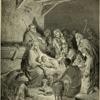Christmas Pondering with Mary
Christmas Pondering with Mary
“But Mary treasured up all these things,
pondering them in her heart.”
– Luke 2:19

“But Mary treasured up all these things,
pondering them in her heart.”
– Luke 2:19
Luke 2:8-20 is one of the most familiar passages in the entire Bible. If we’re raised in the church, we hear it every year at Christmas (most likely, more than once). Many of us can recite some or all of it. It’s found in books and films, even those that are not overtly Christian or religious. We know the story: the hardship, the miraculous, the spectacular, the worship, and the blessing. And we know well the ending of the passage: Mary preserved and treasured all these things and pondered them in her heart.
If there ever is a time well-suited for pondering, Christmas Eve is it. Especially this year.
We tend to think of pondering as primarily an intellectual activity: to think carefully about something; reflect on; consider thoroughly and deeply; study; ruminate (like chewing the cud – now that’s a vivid picture for Christmas Eve!); think upon weighty thoughts. Indeed, our English word comes from the Latin (ponderare), meaning to weigh.
But the Scripture says Mary kept all these things safe, and pondered them in her heart.
We can look to the Psalms for a more complete picture of pondering, one that includes heart and spirit, as well as head. There are a handful of words that are variously translated meditate, search out, commune, and ponder. “I will ponder all Your works” (64:9, 77:12, 107:43, 111:2, 143:5). “I will meditate with my heart, and my spirit ponders” (77:6). And we even find this: “Ponder in your own heart” (4:4).
Mary had so much to ponder on this night: Her betrothal to Joseph; the unsettling appearance of the angel Gabriel, the message that she would become the mother of the long-promised Messiah – conceived miraculously by the Holy Spirit – the very Son of God. Perhaps she remembered God’s steadfast love and faithfulness in her life, so that she was willing to reply, “Yes, let it be to me according to your word.”
Her pondering would surely include her visit to her cousin Elizabeth, who was in the sixth month of her own miraculous pregnancy; the affirmation from Elizabeth’s testimony that the babe in her womb – John the Baptist – leapt for joy at the sound of Mary’s greeting; and Elizabeth’s exclamation, inspired by the Holy Spirit, that Mary was “blessed among women” and “the mother of my Lord.” What blessed, strengthening things to support and sustain Mary when she returned home, surely to suspicion and judgment, even by Joseph!
Did Mary perhaps stay with Elizabeth and Zechariah until the birth of their son? We’ve tended to assume not, since we read that she remained there about three months and returned to her home, and then follows John’s birth narrative. But Luke is not definitive. He may have been following the narrative custom of finishing the Mary component of the story before going on to the next topic. What if she was there? She would have witnessed the joy of the naming ceremony, the miracle of Zechariah regaining his ability to speak, the prophecy that this child would be the one who would prepare the way of the Lord – her Son. And she would have witnessed the traditional gathering of friends, neighbors, and musicians, rejoicing and celebrating the birth of the baby boy.
Six months later – six challenging, difficult months later – she arrived in Bethlehem with Joseph. Though they knew the time of birth was drawing near, they had no choice but to obey Caesar’s decree that all in the Roman empire go to the town of their ancestral heritage in order to register for the census and taxation. So they traveled the 80 or so miles from Nazareth to the City of David. Such a throng of people! No space, and no place, no guest room, no familial corner even for her to give birth to the Son of God. But there was a stable, and a manger with straw for her to lay her newborn son, whom she had wrapped in swaddling clothes.
Then come the shepherds, with their miraculous, wondrous, blessèd story of the appearance of an angel who announced to them the joyful tidings of the Savior’s birth. (Of course she believes them!) And then they tell of the multitude of the heavenly host, in glory, praising God and declaring peace.
Here are Mary, Joseph, and Jesus, and an assortment of animals. No friends or neighbors in their quiet stable to sing and rejoice with them. No. But God sent the heavenly host to fill the skies with celebration! And the shepherds to come to worship, to tell the holy family of the wonders. When they go, they share with everyone they meet, who likewise wonder.
But Mary pondered these things in her heart.
What about Joseph, and the shepherds? They certainly had things to ponder, too, and no doubt did so. Joseph had his own visit from an angel, who appeared in a dream to reassure him that Mary’s son was conceived of the Holy Spirit and that the Child was to be the fulfillment of the promised Immanuel of prophecy, God with us. Joseph would have other, similar dreams later, along with the knowledge that God had brought them safely to Bethlehem, even in the midst of political churnings under the surface of the Pax Romana, religious controversies, economic resentments, various dangers along the road, and the like.
And what of these shepherds? Some commentators note that they were likely very special shepherds – Temple shepherds who pastured their flocks near Bethlehem, and it was from these flocks that the perfect Temple offerings were chosen. One writer (William Barklay) notes this: “It is a lovely thought that the shepherds who looked after the Temple lambs were the first to see the Lamb of God who takes away the sin of the world.”
But Luke concentrates his narrative on Mary. There are several reasons for this that have to do with the whole of God’s story. But I think a main one has to do with our hearts.
Remember that Luke was also known as “the beloved Physician” who traveled with Paul in his missionary journeys. What might their conversations have been? I can imagine that their ponderings can be seen in something Paul writes in Galatians 4: When the fullness of time had come, God sent forth His Son, Jesus Christ our Lord, born of a woman, born under the Law, so that He might redeem us, that we might receive adoption as God’s children. As Paul talks about what this means, he says he earnestly desires that Christ be formed in our hearts through faith.
Mary was in the unique – and blessèd – position of Christ, the Messiah, the Lord, being physically formed within her. Yet, it was necessary for her, too, that He be formed in her heart through faith. And so, she pondered.
One last thought: the French abbot Bernard of Clairvaux wrote in the 12th century of three Advents. Tonight we commemorate the first Advent of the Word made flesh, and we also look forward to His second coming in power and glory at the end of the age. And we thankfully meditate on – and ponder – what Bernard called the third Advent, the coming of Christ into our own lives, and pray that He again—continually— will be born in our hearts and create us anew.
On this night, and throughout this season, at the end of this very long and challenging year, let us – with Mary, Joseph, the shepherds, Luke, Paul, Bernard, and countless others – turn our meditations and ponderings to the joy and peace of the message of the coming of the Messiah, to God’s faithfulness and love, to those things that form us in His image and grow us in Him.
This Reflection is adapted from Ellen’s devotional on Luke 2:8-20 for the Epiclesis Christmas Eve online service (2020). This service is archived on the Epiclesis Facebook page.
Image credit: Gustave Doré, Nativité (1891).
Copyright ©2020 Ellen Koehler. All Rights Reserved.


Login or Register
to view and post comments